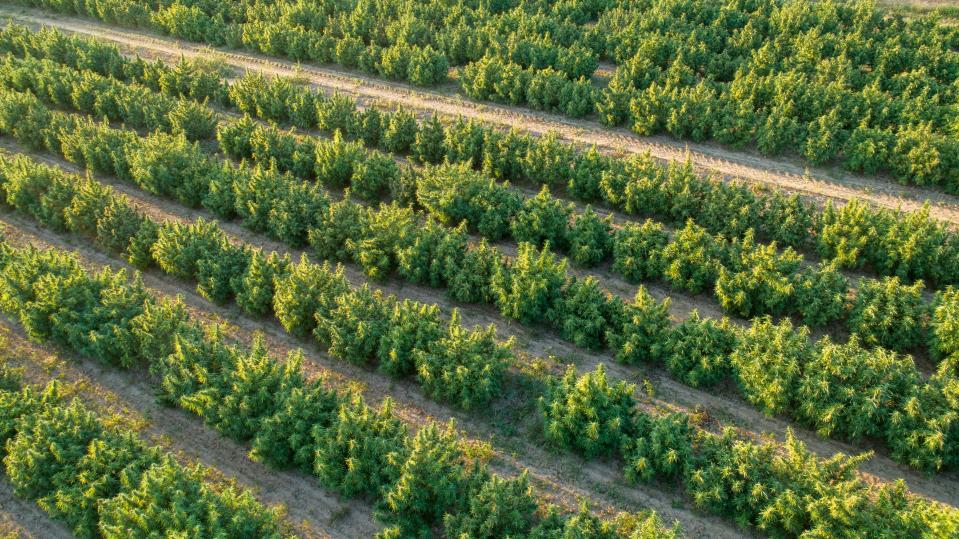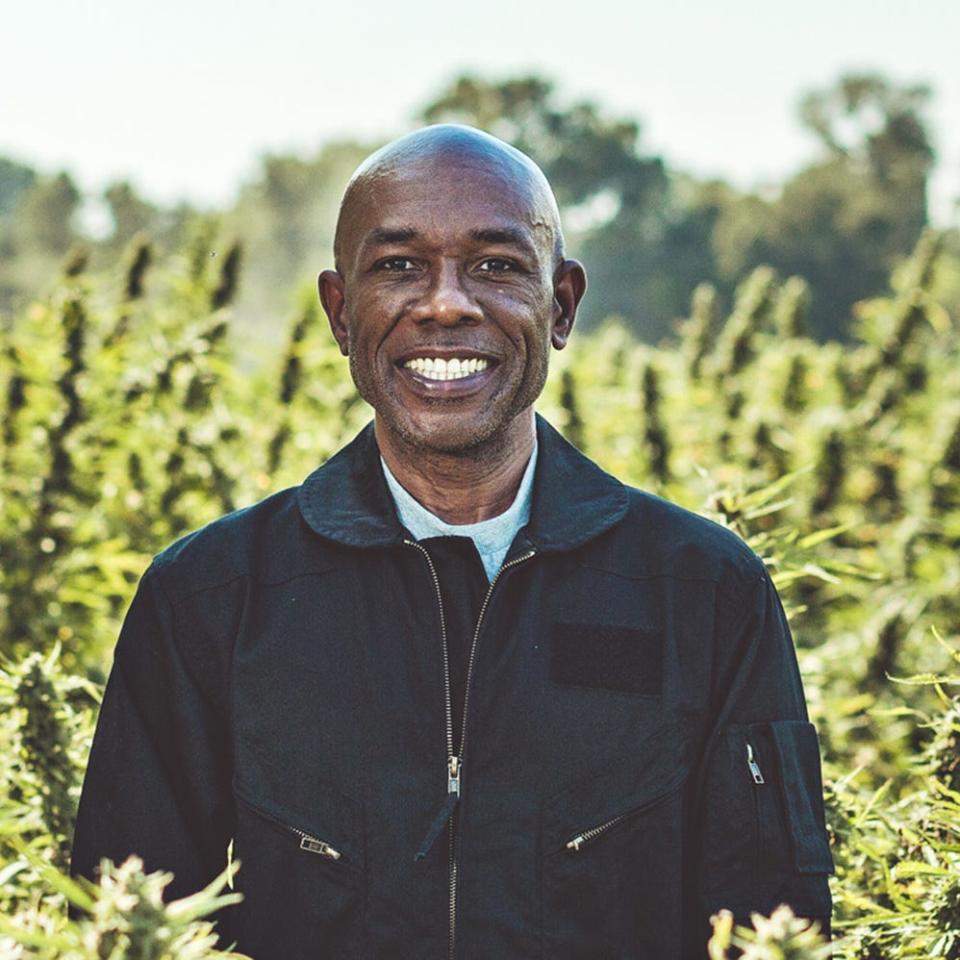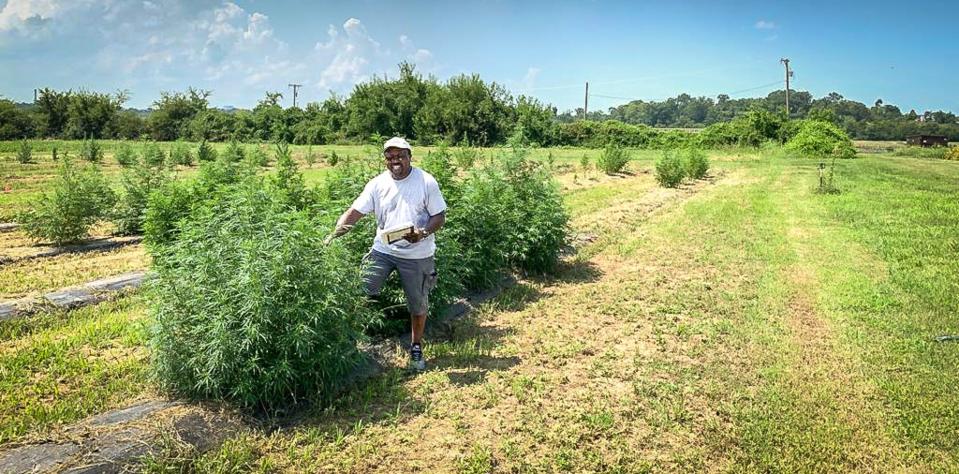Is hemp making a comeback? Tennessee farmers eye an era beyond CBD
They called it another "gold rush."
That phrase was on heard all the time after the 2018 Farm Bill legalized commercial hemp farming. Both experienced farmers and brand new growers wanted to plant hemp, which by law can have no more than 0.3% of the psychoactive substance in marijuana, and sell the flowers for CBD. They could make $15,000 an acre, maybe a lot more, it was said.
“When we started running some programs back in 2017 and 2018, we were getting 500 to 1,000 people show up that were interested in hemp,” said Aaron Smith, a crop marketing specialist in the University of Tennessee’s Department of Agriculture and Resource Economics.
In 2019, more than 2,600 Tennesseans held licenses to grow hemp, a 1,100% increase from the year before. The state at the time ranked among the top 10 for hemp production, according to Hemp Benchmarks.

“Bust,” “crash,” “bottom falling out” and “bubble bursting” are how those in the hemp industry describe what happened next. Most medical uses of CBD remain unproven. And processing facilities for CBD were insufficient. Many growers found themselves with warehouses of hemp they could not sell.
“People, I think, just got way ahead of the market,” said Adam Koh of Hemp Benchmarks, which tracks the price of hemp in North America. “Unfortunately a lot of producers and a lot of processors didn’t make out very well.”
Last year, according to the U.S. Department of Agriculture, the value of hemp produced in the United States was down 71% from the year below. And in Tennessee, only 312 producers currently have licenses to grow hemp, said the Tennessee Department of Agriculture.
“One of the big challenges we had back in ’17 and ’18 was there was not a lot of information that was available,” said Smith of the University of Tennessee. “When you have an information void, that gets filled with a whole bunch of bad information.”
Smith has not given up on hemp. But the future, he thinks, will be fiber. Instead of flowers for CBD, the plant's stalk will be used for fabric, paper, biofuel, building materials and even plastics. The financial rewards will be more modest, but hemp can also benefit the environment. Tennessee, some argue, is uniquely situated for fiber hemp with a number of companies in the state that might switch to hemp from other raw materials.
“I’m still cautiously optimistic,” Smith said.
A future for fiber
Hemp has a long history. The plant likely originated in China, and by the Middle Ages, it was widely used in Europe for fiber and food. In the United States, hemp became an important crop in the late 18th century for rope, sails and cloth.
In Tennessee, hemp farming began in the early 19th century. The state seemed poised to have a substantial hemp industry, but soon farmers in Missouri, Illinois and Kentucky took the lead.

Eventually, hemp would be lumped in with cannabis and effectively banned by the Marihuana Tax Act of 1937. The Controlled Substance Act of 1970 made that ban official.
Long before hemp was illegal, however, it had fallen out of favor. Steam-powered ships decreased the need for sailcloth. New synthetic fibers were cheaper for many other uses. And cotton made a comeback in the Deep South due to the invention of the cotton gin.
Frederick Cawthon, as president of the Hemp of Alliance of Tennessee, is one of the state's biggest boosters for a modern revival of hemp. He has not given up on CBD, nor has the state. The latest data from the Tennessee Department of Agriculture shows 98% of the state’s license holders are producing hemp for CBD.
But when Cawthon makes the case for hemp’s future, fiber is what excites him. During an interview, he pulled up a chart that showed how this single plant can make dozens of products, from traditional uses like paper and cloth to new items such as insulation or bio-composite plastics.
“This is raw material for the next park bench or church pew,” Cawthon said. “Just because you’ve got a row crop of hemp out there does not mean there’s a bunch of hippie stoners sitting on your lawn.”

Cawthon is particularly excited about the opportunities for Tennessee to supply hemp derived parts to the auto manufactures. Some companies, like Volkswagen, have already incorporated many hemp-based parts into their vehicles.
“Tennessee is the hub of the new automotive manufacturing landscape,” he said. “We sit right in the middle of the whole automotive supply chain.”
Climate change is key
The legalization of commercial hemp by the 2018 Farm Bill made it possible to think about the possibilities of hemp. Climate change made the conversation feel urgent. Instead of talking about big paydays, the promoters of fiber hemp focus on how this plant can help the warming planet.
Hemp grows more quickly than trees used for paper pulp. Car parts made with hemp could decrease the use of petroleum, an ingredient in plastic. And the fast growing plant itself pulls carbon out of the atmosphere.
“According to studies, it has been shown that within two to six months that hemp is growing, it can pull out of the atmosphere two to three times more carbon dioxide than trees,” said Emmanuel C. Omondi, a professor who studies hemp at Tennessee State University.

The Biden administration has made climate change a top priority through its Climate Smart initiative. Omondi received a $5 million grant from USDA to study fiber hemp. For the grant, Omondi is working in partnership with the University of Tennessee, the Tennessee Department of Agriculture and the Hemp Alliance of Tennessee.
More: Black farmers and climate change: TSU prioritizes addressing environmental challenges
Hemp, Omondi believes, would make sense as a crop that farmers could include in a rotation with established crops like corn or soybeans. The hemp can help control weeds and improve the quality of the soil, he said.
Omondi knows, however, that collapse of the CBD hemp market will make farmers suspicious of fiber hemp.
“A lot of growers do not want to touch any hemp with a 10-foot-pole,” he said.
And while fiber hemp is full of possibilities, they remain largely hypothetical in the United States until more companies invest in facilities to process the plant.
In the South, varieties of hemp that can withstand the heat are still being developed. And few chemicals have been approved to control weeds and insects on hemp.
“It’s going to be difficult, because all of these other commodities are familiar, and the potential profits are easily recognized,” said William Corbin, who has grown trials of hemp on his farm in Middle Tennessee.
More: How will hemp products fare in new federal farm bill? What one key TN US House member says
Once more companies are able to process fiber hemp, once there is a buyer for the crop, farmers will sign up to grow, said Nick Walters, the managing partner of the Mississippi-based National Hemp Growers Cooperative. Walters believes that will happen within the next couple of years. And he thinks the South will take the lead in fiber hemp.
“Long term, I really believe that the Southeast is going to be the better place, because of water rights and access to ports,” he said.
Todd A. Price cover the South for the USA TODAY Network. He can be reached at taprice@gannett.com.
This article originally appeared on Nashville Tennessean: Tennessee farmers eye post-CBD hemp production, facilities

